Future of Rust Programming Language in Singapore (2025 Guide for CTOs & Enterprise Leaders)
As Singapore’s enterprises continue to innovate and adopt new technologies, many are turning to the Rust programming language in 2025. Known for its combination of memory safety, high performance, and concurrency, Rust is rapidly becoming the go-to choice for businesses aiming to build secure and scalable systems.
For enterprises, Rust offers significant benefits—enhancing security in critical applications, improving performance in cloud-native systems, and driving innovation in AI and blockchain solutions. As companies seek to stay ahead in the competitive landscape, adopting Rust can provide long-term advantages in terms of scalability, security, and efficiency.
Then, what is the future of rust programming language? In this guide, we explore how Singapore’s top industries are benefiting from Rust and why this language is shaping up to be a game-changer for businesses in 2025 and beyond.
Table of Contents
- Rust Programming Language Overview
- What Can Rust Be Used for in Singapore Enterprises?
- Advantages of Rust Programming for Singapore Businesses
- Rust vs Other Programming Languages: Which Should Singapore Enterprises Choose?
-
Top 10 Rust Programming Trends in Singapore (2025)
- WebAssembly (WASM) Integration
- Embedded Systems & IoT
- Machine Learning and AI
- DevOps & Cloud-Native Development
- Game Development & Esports Innovation
- Blockchain & Web3 Adoption
- Enterprise Adoption & Standardization
- Enhanced Developer Experience
- Interoperability with Other Languages
- Education & Career Opportunities
- Challenges That Could Shape Rust’s Future in Singapore
- What the Future of Rust Means for Singapore Enterprises
- How Kaopiz Can Help Singapore Businesses with Rust Development
- Conclusion
- FAQs
Rust Programming Language Overview
Rust is a modern systems programming language designed for performance, memory safety, and concurrency. In this section, we explore what makes Rust unique, its current position in the web application languages, and the key updates that continue to drive its adoption across industries.
What Is Rust?
Rust is a systems programming language focused on performance, memory safety, and concurrency. It prevents memory-related errors through a unique ownership model, offering efficient memory management without a garbage collector. Rust is one of the fastest programming languages. It is ideal for building fast, secure, and reliable applications in areas like systems programming and blockchain.
Rust’s Current Position in the Programming World
Rust has firmly established itself as a powerhouse in the programming world, with over 2.3 million developers and a 68.75% increase in business adoption. According to the 2024 JetBrains Developer Survey, 709,000 developers now consider Rust their primary language, with a surge in adoption across cloud and embedded systems.
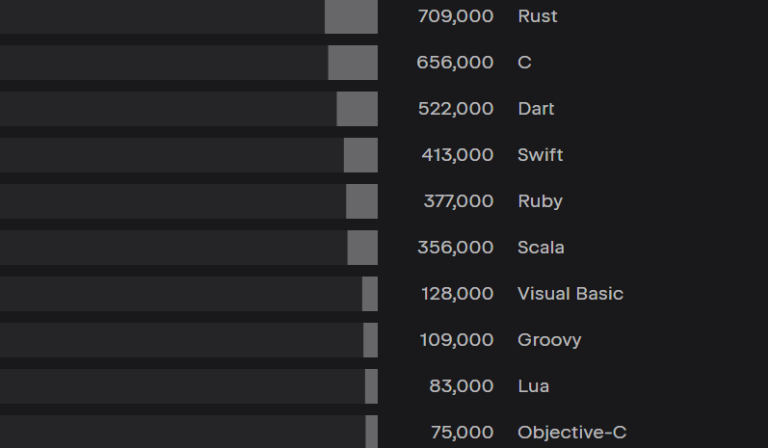
Its growing popularity is driven by its open-source community, which has contributed over 80,000 libraries on crates.io. Therefore, it is creating a rich ecosystem for businesses looking for robust, high-performance IT solutions. Major companies like Microsoft, Amazon, and Google are increasingly leveraging Rust, cementing its place as a top choice for modern software development.
Latest Rust Version & Key Updates
The Rust 1.89.0 release (7 August 2025) brings several exciting updates that enhance the language’s performance, stability, and usability. Key features include:
- Const Generics: Rust now supports inferred arguments in const generics, allowing for more concise code, as seen with the introduction of the _ argument.
- Lifetime Syntax Lint: The mismatched lifetime syntaxes lint warns about confusing lifetime annotations, improving code clarity and helping developers avoid common pitfalls when using lifetimes.
- New x86 Target Features: Added support for SHA512, SM3, SM4, and AVX512 intrinsics on x86, enabling better performance for cryptographic and SIMD operations.
- Cross-Platform Enhancements: i128 and u128 can now be used in extern “C” functions without warnings, and there is improved compatibility for WASM (WebAssembly), making it a more robust platform for developers.
- Platform Support Changes: The x86_64-apple-darwin target is moving to Tier 2, reflecting changes in Apple’s support for the architecture, while new Tier-3 targets like loongarch32 are being added.
- Stabilized APIs: Several important APIs are now stable, including NonZero<char>, File::lock, and TcpStreamExt::quickack for Linux.
With these updates, the future of Rust language continues to evolve. It is a high-performance, secure language, further solidifying its role in critical systems, cloud-native applications, and modern software development.
What Can Rust Be Used for in Singapore Enterprises?
Rust’s versatility makes it a strong contender for a wide range of applications in Singapore enterprises. Below are key areas where Rust is being adopted to address performance, security, and scalability challenges:
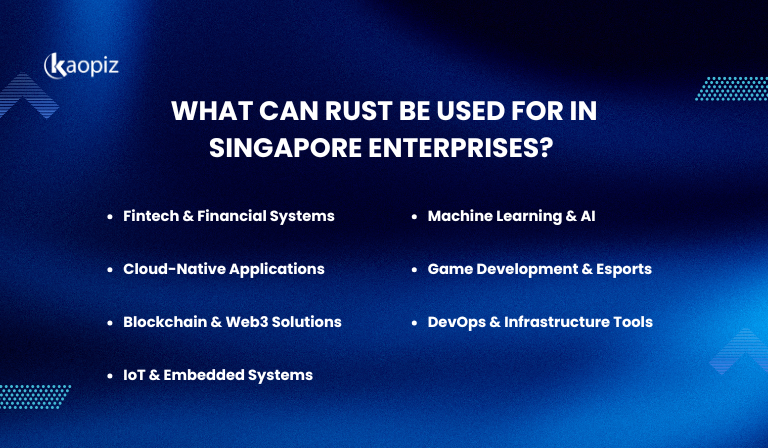
- Fintech & Financial Systems: Secure, high-performance systems for trading platforms, payment systems, and banking infrastructure.
- Cloud-Native Applications: Ideal for microservices and containerized environments, offering low latency and high scalability.
- Blockchain & Web3 Solutions: Used for developing smart contracts, crypto wallets, and decentralized applications (dApps).
- IoT & Embedded Systems: Perfect for IoT devices and wearables, with real-time data processing and memory safety.
- Machine Learning & AI: Data-intensive AI applications in finance and healthcare, with fast processing and efficient memory management.
- Game Development & Esports: High-performance game engines and interactive gaming experiences for the gaming industry.
- DevOps & Infrastructure Tools: Building DevOps solutions for cloud orchestration, automation, and deployment pipelines.
Advantages of Rust Programming for Singapore Businesses
Rust offers several compelling benefits for Singapore enterprises, particularly in industries focused on security, performance, and scalability. Here are the key advantages:
- Memory Safety: Rust’s ownership model ensures memory safety without the need for a garbage collector, reducing common bugs like null pointer dereferencing and buffer overflows. This is critical for industries like finance and healthcare, where data integrity is paramount.
- High Performance: Rust delivers near-C/C++ performance while maintaining safety. Its low-level control makes it ideal for high-efficiency applications, like cloud-native systems and real-time apps.
- Concurrency Without Fear: Rust’s concurrency model allows for multi-threaded applications without the risk of data races. This feature is crucial for DevOps tools, cloud platforms, and distributed systems that require parallel processing at scale.
- Cost Savings in the Long Run: Rust’s focus on reliable code and error prevention translates to fewer bugs and less debugging time, leading to lower maintenance costs. Over time, this reduces the total cost of ownership, particularly for long-term projects.
- Scalability: With its performance and memory management, Rust can handle the needs of large-scale enterprise systems, making it a great choice for enterprise software, IoT, and cloud-native applications.
- Active and Growing Ecosystem: Rust’s open-source community continues to expand, with 80,000+ libraries available on crates.io. This rich ecosystem enables businesses in Singapore to rapidly prototype and scale solutions, tapping into ready-made tools for various use cases.
- Enhanced Security: Rust’s built-in security features, such as data race prevention and memory safety, help protect against vulnerabilities often seen in C/C++ and other languages. This makes it particularly useful for financial systems, blockchain applications, and critical infrastructure.
Adopting Rust can provide Singapore enterprises with a modern, efficient, and secure foundation for building future-proof applications in industries such as fintech, blockchain, cloud computing, and IoT.
Rust vs Other Programming Languages: Which Should Singapore Enterprises Choose?
With many programming languages available, Singapore enterprises face the challenge of selecting the right one for their needs. In this section, we compare Rust with popular languages like C/C++, Go, and Python/Java to help businesses make an informed decision based on performance, security, and scalability.
| Feature | Rust | C/C++ | Go | Python/Java |
|---|---|---|---|---|
| Memory Safety | Enforced at compile-time through ownership | Manual memory management, prone to errors | Garbage collection, prone to memory leaks | Garbage collection, not memory-safe by default |
| Performance | High performance with zero-cost abstractions | Native, extremely fast | High, but typically slower than Rust | Slower compared to Rust and C/C++ |
| Concurrency | Safe concurrency without data races | Manual thread management and locks | Built-in concurrency (goroutines) | Limited support (threads, async IO) |
| Ease of Use | Steep learning curve, but modern syntax | Steep learning curve, complex syntax | Easy to learn and use | Easy to learn, especially for beginners |
| Error Handling | Strong type system and compile-time checks | Weak error handling, manual management | Simple error handling with return values | Exception handling with try/except (Python) |
| Ecosystem/Tooling | Growing ecosystem with robust tooling | Mature but fragmented ecosystem | Rich ecosystem for web and cloud apps | Extensive ecosystem for web, data, and AI |
| Use Cases | Systems programming, cloud, blockchain, IoT | Embedded systems, real-time, high-performance applications | Web services, cloud-native, microservices | Web development, data science, AI |
| Cross-Platform Support | Excellent cross-platform support | Excellent, especially for embedded systems | Good for cloud-native apps | Excellent, especially for web development |
| Security | Built-in security features | Vulnerable to memory errors and bugs | Moderate (garbage collection issues) | Depends on implementation (not memory safe) |
| Adoption in Industry | Growing rapidly in fintech, cloud, blockchain | Long-standing use in legacy systems | Popular in cloud and microservices | Dominates in data science, AI, and web development |
Rust vs C/C++
Both are high-performance languages for systems programming, offering fine-grained control over memory.
Differences:
- Memory Safety: Rust’s ownership model prevents memory errors at compile-time; C/C++ relies on manual memory management, leading to a higher risk of bugs.
- Learning Curve: Rust’s ownership and lifetime management create a steeper learning curve, while C/C++ is more familiar for developers used to low-level programming.
- Concurrency: Rust ensures safe concurrency and prevents data races at compile-time. C/C++ requires manual thread management.
Best Choice:
- Rust is ideal for new, safety-critical projects like cloud systems and blockchain.
- C++ is best for legacy systems and high-performance applications that need manual memory control.
Rust vs Go
Both Rust and Go excel in building scalable, cloud-native applications with high concurrency.
Differences:
- Concurrency: Go uses goroutines for easy concurrency, while Rust ensures safe concurrency with compile-time checks for data races.
- Performance: Rust offers better performance due to low-level control. Go prioritizes simplicity over raw speed.
- Ecosystem: Go has a mature ecosystem for cloud-native development. Rust’s ecosystem is still growing, but it is strong in performance-critical areas.
Best Choice:
- Rust is best for high-performance and safe concurrent applications in cloud systems.
- Go is ideal for rapid cloud-native development and microservices.
Rust vs Python/Java
Rust, Python, and Java are all used for enterprise applications, but they cater to different needs.
Differences:
- Use Cases: Python excels in AI, data science, and rapid development. Java is dominant in enterprise software and web applications. Rust is best for high-performance, secure systems programming and concurrent applications.
- Adoption Speed: Python and Java have established ecosystems and broader adoption. Rust is gaining traction quickly in systems programming and performance-critical applications.
Best Choice:
- Rust is perfect for performance-driven, secure applications.
- Python is best for AI and data science.
- Java is ideal for enterprise systems.
Top 10 Rust Programming Trends in Singapore (2025)
In 2025, Rust continues to gain momentum in Singapore’s tech ecosystem, driven by its performance, safety, and scalability. This section highlights the top trends shaping the future of Rust programming language across industries in Singapore.
WebAssembly (WASM) Integration
The future of Rust programming language is promising as its integration with WASM is a game-changer for web development in Singapore. WASM allows Rust to run high-performance code directly in the browser, enabling developers to build interactive, fast web applications without relying on JavaScript for computationally intensive tasks.

With WASM, Rust can be used to develop everything from dynamic websites to gaming engines and data visualization tools in the browser, offering native performance while maintaining memory safety. As Singapore embraces cloud-native and digital-first solutions, this integration allows businesses to create cutting-edge web apps that run efficiently on both desktop and mobile platforms.
Embedded Systems & IoT
Rust is quickly becoming a top choice for Embedded Systems and IoT due to its memory safety, performance, and low resource usage. In industries like healthcare, automotive, and smart cities—key to Singapore’s Smart Nation initiative—Rust offers a secure and efficient alternative to C/C++, ensuring real-time processing without the risk of memory errors.
With its ownership model, Rust guarantees memory safety even in resource-constrained environments, making it perfect for developing wearables, sensors, and embedded devices. As IoT solutions continue to grow in Singapore, the future of Rust programming language is clear. Rust’s performance and tool support position it as a powerful language for creating secure, high-performance connected systems.
Machine Learning and AI
Rust is gaining popularity in ML and AI due to its performance and memory safety. While Python leads in AI, Rust’s speed and control make it ideal for high-performance AI systems, especially when processing large datasets. Its ownership model prevents runtime errors, which is crucial for complex AI tasks.
In Singapore, where AI is driving innovation in finance, healthcare, and smart cities, the future of Rust programming language looks promising. Rust is emerging as a strong choice for scalable and secure AI solutions. With its expanding ecosystem, Rust is increasingly used for data processing, AI model optimization, and analytics, providing a faster and safer alternative for data-intensive applications.
DevOps & Cloud-Native Development
Rust is increasingly used in DevOps and cloud-native development for its performance, reliability, and scalability. Its low latency and memory safety make it ideal for building high-performance tools in CI/CD pipelines, containerization, and infrastructure automation.

As cloud-native apps grow in Singapore, Rust’s ability to integrate with microservices and distributed systems makes it a strong choice for secure, scalable cloud solutions. Rust enables businesses to develop efficient, safe infrastructure tools that ensure both performance and safe concurrency.
Game Development & Esports Innovation
Rust is becoming a popular choice in game development and esports innovation due to its performance and memory safety. With growing demands for high-speed and lag-free gaming experiences, Rust’s ability to handle complex, resource-intensive tasks while maintaining safety makes it ideal for building game engines and interactive gaming applications.
In Singapore, as the esports industry continues to expand, Rust’s low-level control allows developers to create high-performance, scalable games that can handle large user bases and real-time data processing. By leveraging Rust’s safe concurrency, game developers can also ensure smoother gameplay and reliable multiplayer experiences.
Blockchain & Web3 Adoption
Rust is gaining popularity in blockchain and Web3 development due to its security, performance, and scalability. Major blockchain platforms, like Solana, rely on Rust for its ability to build high-performance, secure smart contracts and decentralized applications (dApps). Rust’s memory safety ensures fewer vulnerabilities in critical systems like cryptocurrency platforms and distributed ledgers.
In Singapore, where Web3 and crypto are rapidly evolving, Rust is becoming the go-to language for building scalable and secure blockchain solutions. Its speed allows for efficient handling of complex transactions, while its safe concurrency ensures reliable operation of decentralized finance (DeFi) platforms and smart contract execution.
Enterprise Adoption & Standardization
Rust is gaining momentum in enterprise environments due to its security, performance, and scalability. With its memory safety and concurrency guarantees, Rust is ideal for building high-performance and reliable applications in industries like finance, healthcare, and telecom.
Since Singapore businesses undergo digital transformation, the future of Rust programming language is clear. Rust is becoming a key language for standardizing enterprise software and cloud-native systems, ensuring security, efficiency, and future-proof technology. As companies embrace modern solutions, Rust offers a powerful tool for building scalable, secure, and high-performance applications.
Enhanced Developer Experience
Rust is continually improving the developer experience, making it easier to write and maintain high-quality code. Its modern tooling, including Cargo (for dependency management), rustfmt (for code formatting), and Clippy (for linting), streamlines development workflows and reduces errors. Rust’s strong type system and compile-time checks also help developers catch potential issues early, reducing debugging time.
The Rust community is focused on making the language more accessible, with improvements in documentation, error messages, and educational resources. As a result, developers in Singapore can quickly learn and adopt Rust, making it an ideal choice for teams looking to build secure, performant systems with a smooth development process.
Interoperability with Other Languages
One of Rust’s key strengths is its ability to integrate seamlessly with other programming languages like C, C++, and Python. This interoperability allows businesses to leverage Rust for performance-critical components while maintaining their existing infrastructure in other languages. Rust’s foreign function interface (FFI) makes it easy to call functions and exchange data with C/C++ libraries, allowing for hybrid applications that benefit from Rust’s speed and memory safety.
In Singapore, where companies often deal with legacy systems and multi-language environments, Rust’s compatibility with existing technologies enables smooth integration and migration. This makes it a perfect choice for enterprises that want to modernize their tech stacks without having to rewrite entire systems from scratch.
Education & Career Opportunities
As Rust grows in popularity, education around the language is expanding, with more universities and bootcamps offering Rust courses in Singapore. This provides the next generation of developers with valuable skills for in-demand tech roles.

In the job market, Rust developers are highly sought after, especially in fintech, blockchain, and cloud-native development. As Singapore’s tech industry continues to grow, mastering Rust opens up lucrative career opportunities in cutting-edge technologies and secure software development.
Challenges That Could Shape Rust’s Future in Singapore
While Rust is gaining momentum in Singapore, several challenges may impact its wider adoption:
- Steep Learning Curve: Rust’s ownership system and memory management can be difficult for developers accustomed to languages like Java or Python, slowing adoption in some sectors.
- Complexity of Adoption: Integrating Rust into legacy systems can be challenging, with 45.2% of developers citing complexity as a barrier to adoption.
- Slow Compilation and Debugging: Although tools like rust-analyzer are improving workflows, compilation speed and debugging difficulties remain an obstacle for large-scale projects.
- Limited Industry Adoption: Despite growth, 45.5% of developers worry about insufficient industry adoption, limiting its reach.
- Smaller Ecosystem: Rust’s ecosystem is still maturing, and enterprise-grade libraries are not as extensive as those in languages like Java or Python, which may hinder certain business applications.
Despite these challenges, Rust’s future in Singapore looks promising with growing industry support.
What the Future of Rust Means for Singapore Enterprises
The future of Rust programming language in Singapore offers significant benefits for businesses seeking secure, high-performance, and scalable solutions. As cloud-native apps, blockchain solutions, and real-time systems grow, Rust’s memory safety and safe concurrency make it ideal for industries like fintech, healthcare, and IoT.
Adopting Rust early gives Singapore enterprises a competitive edge with future-proof solutions in secure software, cloud-native development, and high-performance systems. Rust’s growing ecosystem ensures businesses remain ahead in the digital landscape.
How Kaopiz Can Help Singapore Businesses with Rust Development
With 10+ years of experience and 1,000+ successful projects for 200+ global clients, Kaopiz is a trusted IT outsourcing company in Singapore, helping enterprises adopt Rust for their software development needs.

With our expertise in high-performance systems and secure software solutions, we can help businesses embrace the future of Rust programming language. We also leverage its capabilities to build scalable, efficient, and reliable applications across various industries.
- Custom Rust Development Solutions: Kaopiz provides custom Rust development for cloud-native apps and blockchain solutions, ensuring high performance and memory safety for industries like fintech, healthcare, and IoT.
- Staff Augmentation: We offer staff augmentation, supplying skilled Rust developers to integrate with your team, speeding up projects while maintaining top-tier performance and security.
- Legacy System Migration: Kaopiz supports businesses in migrating from legacy systems to Rust-based platforms, ensuring a smooth transition and future-proofing your infrastructure.
- Long-Term Maintenance & Support: We provide ongoing maintenance and support for Rust applications, ensuring they stay secure, scalable, and up to date, allowing businesses to focus on growth.
Kaopiz empowers Singapore enterprises to adopt Rust effectively, helping them build cutting-edge, secure, and performance-driven applications while ensuring long-term scalability and success.
Conclusion
The future of Rust programming language is promising as this language is rapidly becoming a crucial tool for businesses in Singapore seeking high-performance, secure, and scalable solutions. With its growing adoption in cloud-native development, blockchain, and IoT, Rust offers immense potential for enterprises looking to modernize their infrastructure while maintaining reliability and safety.
As Singapore continues its digital transformation, embracing Rust will enable businesses to stay competitive in a tech-driven world. With Kaopiz offering tailored Rust development services, staff augmentation, and legacy system migration, businesses can confidently navigate this transition, ensuring their solutions are future-proof and optimized for success.
FAQs
- Is Rust the Future of Programming in Singapore?
- Yes, Rust programming language’s future is promising. Rust is gaining significant traction in Singapore, particularly in high-performance industries like fintech, healthcare, and blockchain. Its memory safety and performance make it an ideal choice for secure and scalable solutions, positioning it as a key language for the future.
- Why Are Singaporean Companies Adopting Rust for Fintech and Healthcare?
- Singapore’s fintech and healthcare sectors require secure, fast, and reliable applications. Rust’s memory safety features and high performance help reduce errors, improve data integrity, and ensure compliance with strict security standards, making it a perfect fit for these industries.
- Should CTOs and Tech Leaders Learn Rust in 2025?
- Yes, learning Rust in 2025 is a wise decision for CTOs and tech leaders. With its increasing adoption in key industries and its role in cloud-native development and AI, knowing Rust will provide a competitive edge in modern software development and secure systems.
- What Industries in Singapore Will Benefit Most from Rust?
- Industries such as fintech, healthcare, blockchain, IoT, and cloud-native development in Singapore stand to benefit most from Rust. Its performance, memory safety, and concurrency features make it ideal for high-demand, security-sensitive applications.
- Does Rust Have a Future in Enterprise Software and Blockchain?
- Absolutely. Rust is already being adopted for blockchain platforms like Solana and is increasingly seen as a reliable choice for enterprise software. The future of Rust programming language is clear as its ability to ensure high performance and security makes it a strong contender for both enterprise-grade systems and decentralized applications.
Trending Post

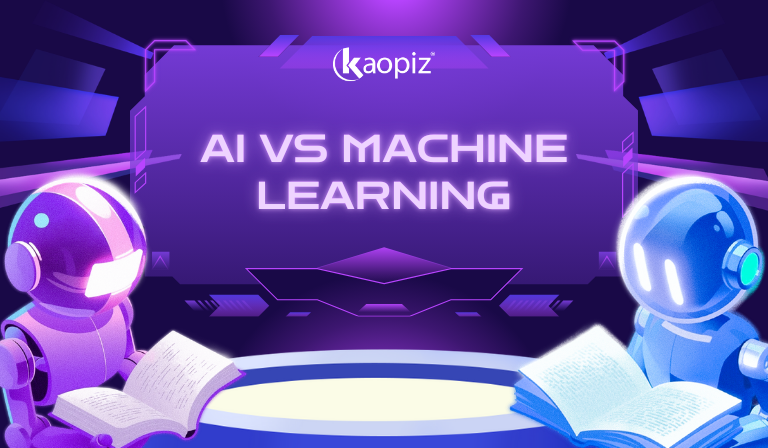
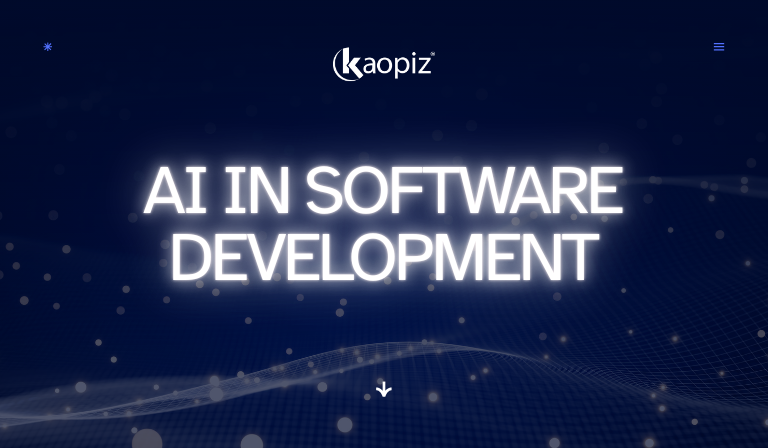
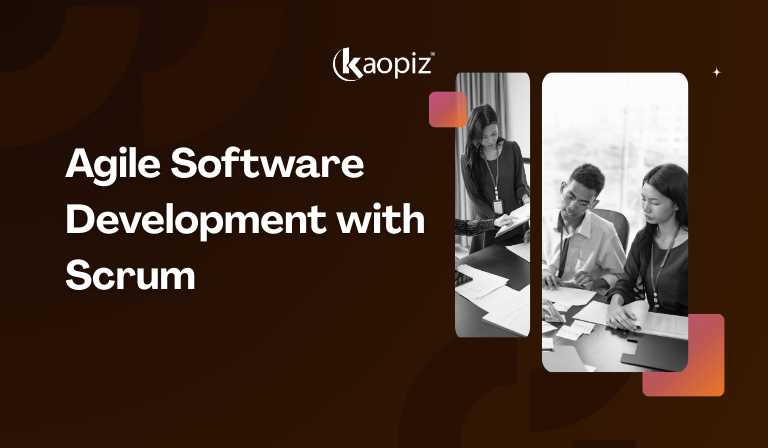

















No Comments yet!